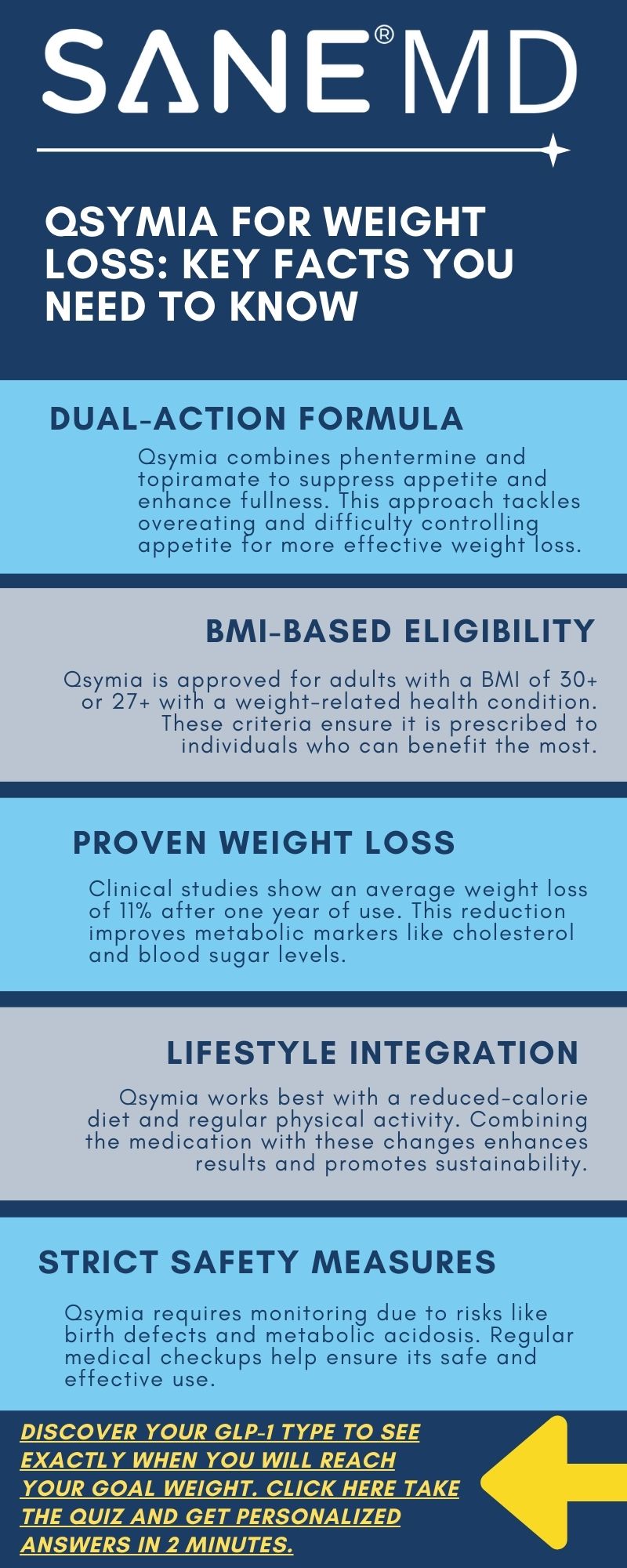Could Qsymia Help You Meet Your Weight Loss Goals? Take the Quiz!
Dr. Matthew Olesiak, MD, is the Chief Medical Director at SANESolution, a renowned wellness technology company dedicated to providing evidence-based solutions for optimal living. Dr. Olesiak earned his medical degree from the prestigious Jagiellonian University Medical College in Kraków, Poland, where he developed a strong foundation in medicine.
Finding the right approach to weight loss can be challenging. Medications like Qsymia® are among the options for individuals who meet specific criteria and are seeking a medical solution to complement lifestyle changes. Could Qsymia help you meet your weight loss goals? This article explores Qsymia, a prescription medication, its benefits, risks, and other essential details to help you make an informed decision.
If you are wondering whether Qsymia or another medication might be right for you, consider taking the weight loss drug type quiz. This quiz provides a personalized starting point for discussing your options with a healthcare provider.
Key Takeaways
Here are the main points to remember as you read about Qsymia:
- Qsymia combines two active ingredients, phentermine and topiramate, to support weight loss by suppressing appetite and enhancing satiety.
- Clinical studies show Qsymia’s effectiveness, but it comes with potential side effects and risks that require medical supervision.
- Consulting a healthcare provider and considering tools like the weight loss drug type quiz can help determine if Qsymia is a suitable option for you.
What is Qsymia?
Qsymia is a prescription weight loss medication combining two active ingredients: phentermine, a centrally acting appetite suppressant, and topiramate, an antiepileptic drug that enhances feelings of fullness. Together, they target key factors that contribute to weight gain, such as overeating and difficulty controlling appetite.
Qsymia is designed for adults with a body mass index (BMI) of 30 kg/m² or higher or those with a BMI of 27 kg/m² or higher who have at least one weight-related health condition, such as type 2 diabetes or high blood pressure. The medication is intended to be used alongside a reduced-calorie diet and increased physical activity.
How Qsymia Works
Qsymia works by harnessing the combined effects of phentermine and topiramate. Phentermine is a sympathomimetic agent that suppresses appetite, while topiramate is an antiepileptic agent that enhances feelings of fullness. Although the exact mechanism of weight loss with Qsymia is not fully understood, it is believed to involve the reduction of hunger and the enhancement of satiety.
Clinical trials have shown that Qsymia can help obese and overweight adults lose weight and achieve significant metabolic benefits. These benefits include reductions in blood pressure and improvements in glycemic control, making Qsymia a valuable tool for those struggling to lose weight and manage weight-related medical problems.
Could Qsymia Help You Meet Your Weight Loss Goals?: Benefits and Effectiveness
Clinical trials have demonstrated the effectiveness of Qsymia for weight loss. On average, patients lose about 11% of their body weight after one year of treatment. This significant reduction can lead to meaningful improvements in health.
Qsymia offers several secondary benefits, including:
- Improved metabolic markers: Reduced cholesterol and triglyceride levels.
- Lower blood pressure: Support for cardiovascular health.
- Better management of weight-related conditions: Enhanced control of type 2 diabetes and other comorbidities.
Although Qsymia has proven effective, individual results vary. A healthcare provider can help assess how this medication fits into your overall weight loss plan.
Safety Information
Qsymia is an FDA-approved controlled substance (Schedule IV) and should be used only under the supervision of a healthcare provider. Due to its potential risks, it’s essential to follow prescribed guidelines carefully.
Patients must have a negative pregnancy test before starting Qsymia and continue with monthly tests during treatment. This precaution is crucial as Qsymia is contraindicated during pregnancy due to its risk of causing birth defects.
Also, Qsymia can interact with certain medications, including prescription pain relievers, sleep aids, and other weight loss drugs. Always disclose your full medical history to your healthcare provider to minimize risks.
Serious Side Effects and Contraindications
While Qsymia can be effective, it may cause serious side effects in some individuals. These include:
- Metabolic acidosis: A condition where there is too much acid in the body.
- Kidney stones: Increased risk due to changes in urinary composition.
- Elevated heart rate: Monitoring is necessary to ensure cardiovascular safety.
Contraindications for Qsymia include:
- Pregnancy: Classified as a Category X medication, it poses significant risks to fetal development.
- Heart disease: Individuals with significant heart conditions should avoid this medication.
- Glaucoma and hyperthyroidism: These conditions also preclude the use of Qsymia.
It is also important to consult a healthcare provider about potential interactions with other medications, including prescription pain medicines and sleep medicines.
Consulting a healthcare provider can help ensure this medication aligns with your health needs.
Dosage and Administration
Qsymia is available in extended-release capsules, with a standard dosing schedule as follows:
- Initial dose: 3.75 mg of phentermine and 23 mg of topiramate daily for 14 days.
- Maintenance dose: 7.5 mg of phentermine and 46 mg of topiramate daily after the initial period.
It’s crucial to take Qsymia in the morning to reduce the risk of insomnia. Pairing the medication with a reduced-calorie diet and regular physical activity enhances its effectiveness.
Patients should follow their healthcare provider’s dosing recommendations and avoid abrupt discontinuation without medical advice.
Getting Started with Qsymia
Starting treatment with Qsymia requires careful preparation. The medication is only available through certified pharmacies and requires a prescription. This ensures patients receive the correct guidance and dosage.
Before starting, carefully read the instructions provided with your prescription. It’s important to address any concerns or questions with your healthcare provider to ensure that you have a complete understanding of your treatment plan.
Monitoring and Follow-up
Regular monitoring is essential while taking Qsymia. This includes tracking your weight, blood pressure, and other relevant health metrics. Follow-up appointments with your healthcare provider allow for adjustments to your treatment plan based on progress and any side effects you may experience.
Promptly reporting any concerns ensures that potential issues are addressed early, contributing to the safe and effective use of Qsymia.
FAQs about Qsymia
Below are answers to common questions about Qsymia. This section is designed to help readers gain a deeper understanding of the medication and its use.
1. How does Qsymia help with weight loss?
Qsymia combines two medications: phentermine, which suppresses appetite, and topiramate, which increases feelings of fullness. Together, they reduce calorie intake and support weight loss when used alongside diet and exercise. These effects make Qsymia a complete option for individuals struggling to lose weight through lifestyle changes alone.
2. Who is eligible to take Qsymia?
Qsymia is prescribed for adults with a BMI of 30 or higher or 27 or higher with at least one weight-related comorbidity, such as high blood pressure or type 2 diabetes. It is not suitable for everyone, and a healthcare provider’s assessment is crucial to determine eligibility.
3. What are the most common side effects of Qsymia?
Common side effects include dry mouth, constipation, dizziness, and insomnia. These side effects are typically mild but can affect daily life. Patients are encouraged to communicate any side effects they experience with their healthcare provider to assess whether modifications to their treatment plan are necessary.
4. Can I take Qsymia if I am pregnant or planning to become pregnant?
No. Qsymia is strictly contraindicated during pregnancy due to its Category X designation, which means it can cause severe harm to a developing fetus. Women must have a negative pregnancy test before starting Qsymia and take precautions to avoid pregnancy while on the medication.
5. How long can I stay on Qsymia?
The duration of treatment with Qsymia varies by individual. Healthcare providers typically evaluate progress every 12 weeks to determine whether continued use is appropriate. Long-term use may be recommended if the medication proves effective and side effects are manageable.
6. Does Qsymia interact with other medications?
Yes, Qsymia may interact with certain medications, including anticonvulsants, antidepressants, and other weight loss medications. It is essential to disclose your full medication history to your healthcare provider to minimize the risk of adverse interactions.
7. Can I drink alcohol while taking Qsymia?
It is generally recommended to avoid alcohol while taking Qsymia. Alcohol can exacerbate some side effects of the medication, such as dizziness and drowsiness, and may interfere with the weight loss process.
8. What happens if I miss a dose of Qsymia?
If you miss a dose, take it as soon as you remember unless it is close to the time for your next dose. Do not double up on doses to make up for the missed one, as this could increase the risk of side effects.
9. How effective is Qsymia for weight loss?
Clinical studies have shown that Qsymia can help individuals lose an average of 5-10% of their initial body weight over a year when combined with diet and exercise. However, results may vary depending on individual factors like adherence to lifestyle changes and personal health conditions.
Conclusion
Qsymia offers a medically supervised option for weight loss, combining appetite suppression and enhanced satiety to support meaningful progress. However, it is essential to weigh the benefits against the potential risks and consult a healthcare provider to determine if this medication fits your needs.
Don’t forget to take the weight loss drug type quiz to explore whether Qsymia aligns with your weight loss goals. With the right approach, including lifestyle changes and medical guidance, achieving your weight loss objectives is possible.





